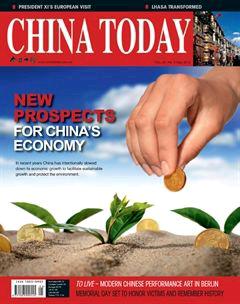Mark Levine’s Songs of China
By+staff+reporter+ZHOU+LIN

HIS trademark cowboy hat and distinctive bushy white beard make Mark Levine an unforgettable figure for anyone who has ever encountered him. Mark holds a Ph.D. in sociology from the United States; now, he is an English teacher, songwriter, singer, author of many articles and the book Stories from My Chinese Journey as well as a lecturer on a variety of topics. These multiple identities smoothly converge in this one person who dedicates himself to conveying an understanding of Chinese culture to the outside world.
Hooked on China
Born in Los Angeles, California in 1948, Mark got his Ph.D. in sociology in 1976. Before coming to China he served for 29 years as a full-time volunteer at organizations for low-income workers in the U.S. He explains that his work in the U.S. led to him learning about China, this booming country.
In 2005, Mark was 57 years old. He made up his mind to visit China, the country that had been vividly depicted by Edgar Snow in his book Red Star Over China. “China in the mid-20th century was very important. I understand that poverty is still a problem in China but the large number of people who have risen out of poverty is impressive. So, when I was given the chance to come to China to teach English for a year, I decided that I should go and take a look.” His Chinese journey began in Zhou Enlais hometown, Huaian City in Jiangsu Province.
Marks plan to stay in China for one year soon changed, and after a second year in Huaian he came to Beijing to teach at Minzu University of China.
Mark recalls his arrival at the Minzu University campus. He had lost his way and needed to seek out someone who could speak English to help. He asked a young woman who was passing by, “Do you speak English?” She quickly answered, “Only a little, but I can show you the way.” This warm-hearted, big-eyed beauty soon became a good friend. During Marks trip to Beijing, Fu Han was not only his translator, but also his guide who showed him the sights.
Mark soon discovered that Fu was an erhu (a two-string bowed instrument) and piano player and a good singer. The two friends later formed a musical duo called In Side Out with Mark on the guitar. The result is a perfect combination of Eastern and Western cultures, creating harmony between U.S. country music and Chinese folk music. They tell Chinese stories through country music to offer a spectacular musical experience to audiences everywhere. Among the many English-language songs they perform are some of the 60 songs that Mark has written about his life and experiences in China.
At the Zhangjiajie International Country Music Week in 2013 the two sang a folk song Coriaria Tree and Cornus Controversa from the local Tujia ethnic group. The song describes two different kinds of tree that grow with one often clinging to the other, just like two lovers who dont want to part. Singing in the local dialect and wearing traditional Tujia clothing while performing, their unique combination of Chinese and Western elements lit up the eyes of many audience members as well as people who saw the live TV broadcast.
Telling Stories through Songs
To begin with, it was not Marks intention to tell his China stories through songs. However, whenever he reflected on an experience hed had or his feelings about people, places or events in China, he would find himself picking up his guitar and playing. All of a sudden an almost chemical reaction would take place. He found that his Chinese stories triggered an unexpected harmony with simple American folk melodies. “After that, I consciously decided to put the two together. If I had thought about it first, it might never have happened, but it just came kind of naturally.”
“People pay attention to me for different reasons: sometimes because of the music, sometimes because of the lyrics. For those who do not speak English and cant understand the lyrics, they feel my love for China through my songs. The love and respect for China coming from the voice and guitar of a foreigner helps Chinese people appreciate their own country.”
Explaining how his performing Chinese songs might serve to attract nonChinese to the music, he says, “If I sing a Chinese folk song, I play it on guitar and although I am singing it in Chinese, I have changed the phrasing and musical arrangement. This makes it more familiar to Western ears. The song can then spark their interest in Chinese songs and whet their appetites, even creating an interest to go back and find out more about where this came from.”
Mark has traveled across more than half of the country. On the road, in addition to singing, he has a bigger interest in learning about Chinese culture, as well as communicating with people he encounters. All his songs help to introduce beautiful Chinese scenery to foreigners.
Mark is eager to spread Chinese culture and convey an image of China not regularly seen in Western media. For instance, he wrote songs about ThreeCharacter Classic, a Chinese classic text dating back to the 13th century, Chinese calligraphy and Chinas long and rich history.
“I want to introduce and promote China to the world. China makes me feel invigorated and hopeful. She has a long history and splendid culture; she has beautiful and glorious scenery and most importantly, she has a strong and determined people who work hard to overcome any barriers to their collective progress. My songs tell you stories that have never been told before.”
I Think, Therefore, I Sing
When he was still teaching in Huaian, Mark gave students in his writing class the assignment of an essay called “What I Have Lived For,” in the spirit of the famous British philosopher Bertrand Russell. “All of my students knew of this essay before they took my class so it seemed appropriate to get them to write something reflecting on their own values and priorities.”
Among the 75 students in his two writing classes, two referred to the gap between the city and the countryside and said that they would commit their lives to narrowing this gap. A third student stated that she would work to improve the well-being of people with disabilities. It was the response of the other 72 students that concerned him and that ultimately contributed to his decision to remain in China past his one year planned visit. These remaining students all said that the focus of their lives was to have a good life for themselves and their families.
“That was it. They made no reference to anyone else. I understand their desire for their families to be OK, but somehow, more than 60 years after the founding of the Peoples Republic of China, so many young people had forgotten or never learned the most important legacy of the PRCs founders, that it is not ‘meor ‘you that I must be concerned about but ‘us, beginning with those of us who are at the bottom because when those at the bottom are OK, the rest of us will do fine as well.”
Mark feels it is his responsibility to pay close attention to peoples livelihoods and reflect on social problems in reality.
“I have heard many Chinese people express the belief that everyone in the United States is rich, but that is far from the truth. Poverty has always existed in the U.S. and over the past 40 years it has gotten worse. As a volunteer organizer on behalf of low-income workers, my primary responsibility was to recruit and train more volunteers from all segments of American society to join the efforts in pursuit of lasting solutions to the problems of the poor.”
Having lived and worked in many of the poorest communities in the United States, Mark knew the conditions first hand and invested nearly three decades in the fight on behalf of the unemployed and the working poor. His familiarity with sociological theory taught him the importance of practice; he left the academic world of theories in pursuit of practice. “I understood the need to do something about these problems and believed that this could best be done out in the community rather than in the confines of a university.”
Marks first train trip in China was from southern Hubei Province to the city of Guangzhou during the Spring Festival in 2009. It was an unforgettable experience. He could only buy a ticket for a hard seat on this 24-hour trip because, he later found, scalpers had bought up scores of train tickets during this special period to sell on for a fat profit, and as a result had hindered many other peoples chances of getting home for holidays. This experience inspired his song The Scalper Man, a phenomenon he associ- ates with Chinas urbanization and social transformation.
In January 2014, Mark took part in the Spring Festival gala for migrant workers on Shaanxi Television. His song Dont Forget the Migrant Workers calls on people to spare a thought for those who, while contributing so much to Chinas economic development, continue to live in great hardship.
Working as a rescue volunteer after the 1989 earthquake in Californias San Francisco Bay area, Mark came to understand the great sorrow of people affected by earthquakes. His song Earthquake Earthquake was written to commemorate the tragic Wenchuan Earthquake in 2008 and to laud the resilience of Wenchuan people.
Mark likes to share experiences with people and a common question he asks those he meets is, “Where are you from?” However, it is interesting for him to discover that most of the people he meets in Beijing are from different parts of China. “Why do they leave their homes and family members? What are they striving for?” he often wondered. He soon found the answer and wrote his findings in the song The Ones They Call Beipiao, which refers to the large numbers of people from all over China and the world who come to Beijing to realize their dreams.
I came to Beijing from my home to work hard for my dreams.
I know Im not the only one, there are many more it seems.
The number it has grown so large, theyve given us a name.
No matter where we come from, Beipiao are all the same.
The life it can be thrilling, with great wonders in our view.
While other times were a little scared that our dreams may not come true.
But either way we keep on, ‘cause we know here we can try
To reach for stars not in the sky, but shining brightly in our eyes.
Mark Levine likes to see himself as a bridge between “foreigners” and the Chinese, and he feels great pride in this role. “I just do what I deem important and meaningful.

